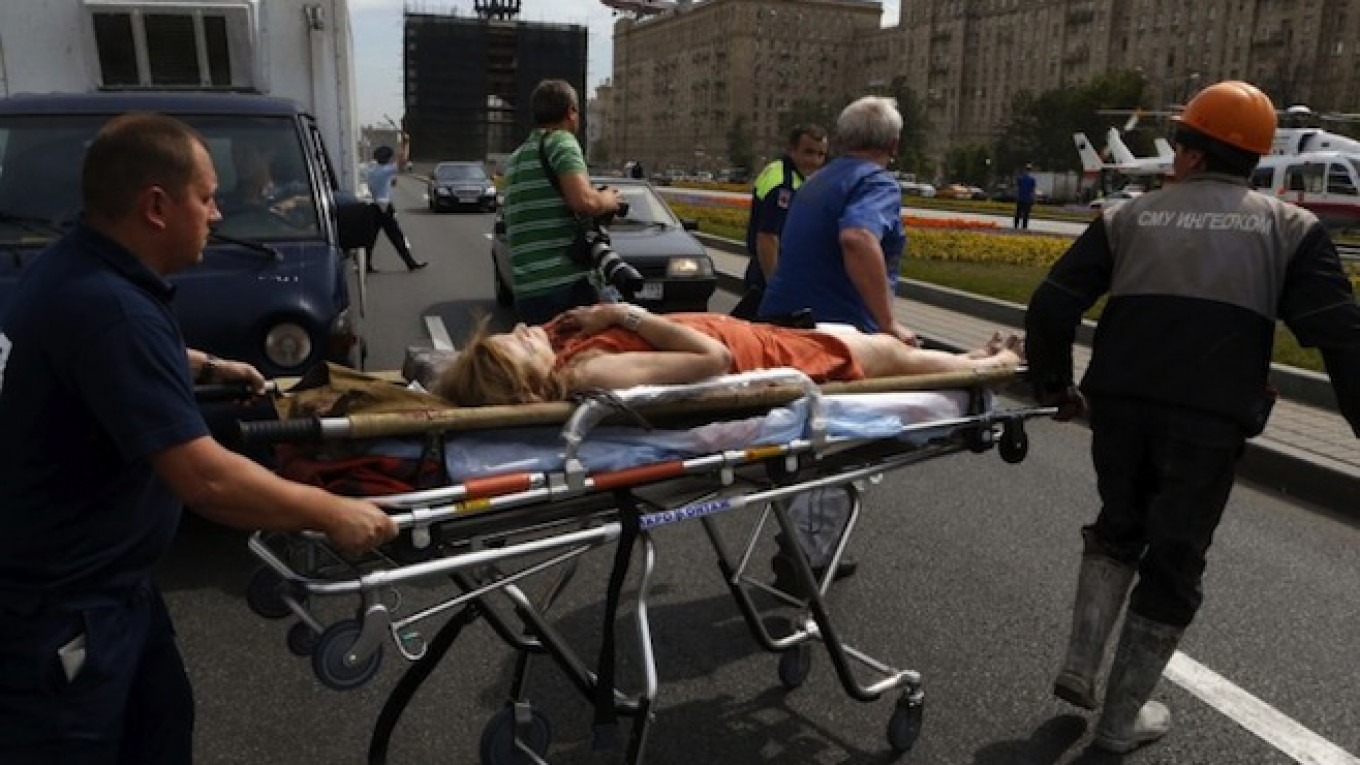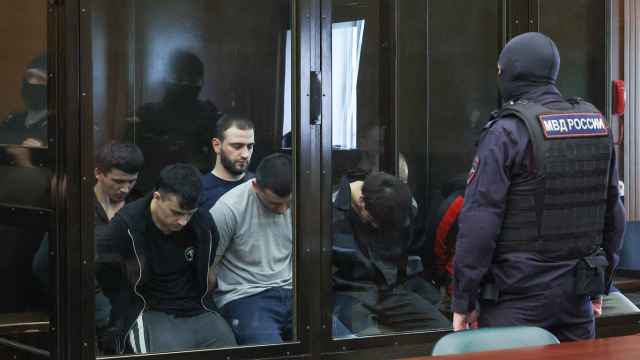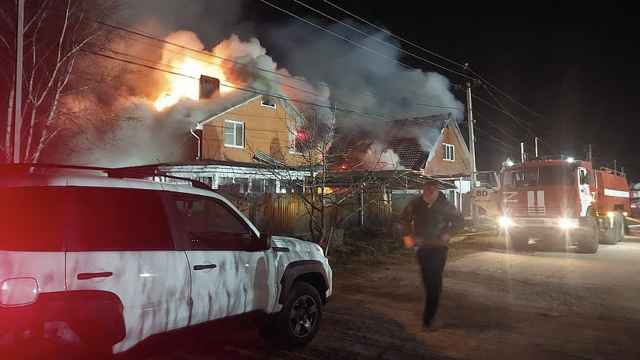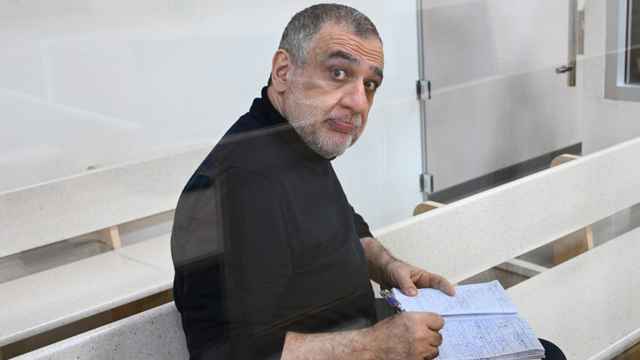Exactly one year after a train crashed into a tunnel wall in the Moscow metro, killing 24 and injuring more than 200 people, efforts to prevent any repeat tragedies are ongoing and visible.
Six central stations were closed on the Red (Sokolnicheskaya) Line on Saturday in the latest in a series of weekend closures aimed at ensuring what happened on July 15 last year on the southwestern part of the Dark Blue (Arbatsko-Pokrovskaya) Line never happens again.
“We close down whole sections of metro lines to upgrade the infrastructure,” Andrei Kruzhalin, spokesman for the head of the Moscow metro, told The Moscow Times last week in a phone interview.
The investigation launched into last year's crash — the worst accident in the history of the metro — came to the conclusion that it was negligence on the part of metro workers that led to the tragedy: The railroad switches at the site of the crash weren't fixed in place properly, and that caused the train to veer off the tracks at high speed.
A week after the catastrophe, the head of the Moscow metro, Ivan Besedin, was fired.
Under his replacement, Dmitry Pegov, the metro administration started the practice of closing down several stations within the Circle (Koltsevaya) Line that encircles the city center for a whole day to conduct necessary repair work.
Nights Not Enough
Usually these closures are scheduled for Saturdays to lessen the inconvenience for passengers, Kruzhalin told The Moscow Times.
Twenty such closures were scheduled for this year, of which 11 have already taken place. On Saturday, when the Kropotkinskaya, Biblioteka Imeni Lenina, Okhotny Ryad, Lubyanka, Chistiye Prudy and Krasniye Vorota stations were closed, 1,000 workers were involved in the maintenance work conducted on a 5.5 kilometer stretch of the line, the metro said in a press release.
“We replace worn out filling brick (stone chipping) and outdated crossties,” Kruzhalin said. “We also use this time to inspect the section and see what's gone wrong. Of course, we do this during the night, too, but some things are very hard to detect at night,” he said.
Overnight breaks are often not long enough to perform the necessary work: By the time the metro is closed and cleaned, there is only a 2 1/2-hour window to work in, Kruzhalin said. Day-long breaks over the weekend, on the other hand, give maintenance staff a gap of 26 hours — 20 times longer than they have overnight.
“Sometimes during these closures we replace the third rail. Obviously we don't have enough time for that at night,” Kruzhalin said.
The Moscow metro is celebrating its 80th anniversary this year, he said, which is why “some infrastructure [is outdated and] requires more than just express repairs” overnight.
The metro started scheduling the weekend closures in the middle of last year and plans to continue through 2017, when, according to Kruzhalin, all the necessary upgrades to the infrastructure should be finished and overnight breaks will once again be enough time to carry out day-to-day maintenance.
“So far we only plan [weekend closures] at stations within the Ring Line,” the spokesman told The Moscow Times. Those stations are the oldest.
Record Pressure
Mikhail Blinkin, a transportation and road construction expert and director of the Institute of Transport Economy and Transport Policy at Moscow's Higher School of Economics, said the Moscow metro experiences more pressure than any other subway system, and therefore it is not surprising that some maintenance work requires longer closures than overnight windows.
“Imagine how much longer the lines are now [than when it opened],” Blinkin told The Moscow Times last week. “The Moscow metro is functioning on the verge of breaking a world record: During the rush hour it carries 65,000 passengers in the same direction,” he said.
The expert said scheduled maintenance can be performed in two ways: Work is done according to instructions and, if there's not enough time to complete it, additional time for it (e.g., a weekend closure) is scheduled, or the work is done as well as it can be in the time period available, in which case the only thing left is to hope for the best.
“The current Moscow metro administration reasonably decided to stick with the first option and not just hope for the best,” Blinkin said. “One of the preconditions for the terrible crash [last year] was relaxed discipline and attitude toward instructions on scheduled maintenance,” he added.
Blinkin said it is common practice all over the world to take as much time over metro maintenance work as needed. In London, home to the world's oldest metro system, regular and long-term Underground closures are a permanent reality.
“It doesn't depend on politics or geography. Everywhere they assess how much work needs to be done and how much time it should take; it is as simple as that,” the expert said.
Plan Your Journey
Station closures are usually announced a week or 10 days in advance on the metro's website and Twitter account, as well as in the media and in posters on the walls of the stations involved and those adjacent to them.
Currently, the posters are in Russian, with a small summary written in English at the bottom. Kruzhalin said the Moscow metro — which has minimal English-language signage in general — doesn't plan to issue the posters fully in English for the time being.
“If we see a lot of foreigners [having problems with it], we will think of a particular way to warn them too,” he said.
Weekend closures are also announced on the day itself by train drivers, as well as by metro staff on duty at station entrances, who explain to passengers why and for how long the station is closed and which one is the nearest alternative.
A Message from The Moscow Times:
Dear readers,
We are facing unprecedented challenges. Russia's Prosecutor General's Office has designated The Moscow Times as an "undesirable" organization, criminalizing our work and putting our staff at risk of prosecution. This follows our earlier unjust labeling as a "foreign agent."
These actions are direct attempts to silence independent journalism in Russia. The authorities claim our work "discredits the decisions of the Russian leadership." We see things differently: we strive to provide accurate, unbiased reporting on Russia.
We, the journalists of The Moscow Times, refuse to be silenced. But to continue our work, we need your help.
Your support, no matter how small, makes a world of difference. If you can, please support us monthly starting from just $2. It's quick to set up, and every contribution makes a significant impact.
By supporting The Moscow Times, you're defending open, independent journalism in the face of repression. Thank you for standing with us.
Remind me later.






